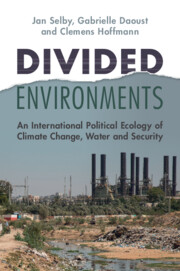Crossref Citations
This Book has been
cited by the following publications. This list is generated based on data provided by Crossref.
Hendrix, Cullen S.
Koubi, Vally
Selby, Jan
Siddiqi, Ayesha
and
von Uexkull, Nina
2023.
Climate change and conflict.
Nature Reviews Earth & Environment,
Vol. 4,
Issue. 3,
p.
144.
Tarusarira, Joram
2023.
The Palgrave Handbook of Religion, Peacebuilding, and Development in Africa.
p.
125.
Floyd, Rita
2023.
Book Review: Contemporary traditional, critical, and Critical environmental security studies explained and evaluated via three books.
Environment and Security,
Vol. 1,
Issue. 1-2,
p.
95.
Benjaminsen, Tor A.
2023.
The risks of ecological security.
New Perspectives,
Vol. 31,
Issue. 1,
p.
25.
Davis, Alexander E.
2023.
The Geopolitics of Melting Mountains.
p.
1.
Povilanskas, Ramūnas
and
Razinkovas-Baziukas, Artūras
2023.
Transboundary Transitional Waters: Arenas for Cross-Border Cooperation or Confrontation?.
Sustainability,
Vol. 15,
Issue. 13,
p.
9922.
Davis, Alexander E.
2023.
The Geopolitics of Melting Mountains.
p.
181.
Stümer, Jenny
2024.
The Border Wall Imaginary at the End of the World.
Journal of Borderlands Studies,
p.
1.
Flamm, Patrick
and
Kroll, Stefan
2024.
Environmental (in)security, peacebuilding and green economic recovery in the context of Russia’s war against Ukraine.
Environment and Security,
Vol. 2,
Issue. 1,
p.
21.
Tkachenko, Aly
2024.
Envisioning ecological security through local direct action: community resistance with global resonance.
Critical Studies on Security,
p.
1.
Daoust, Gabrielle
and
Selby, Jan
2024.
Climate change and migration: A review and new framework for analysis.
WIREs Climate Change,
Vol. 15,
Issue. 4,
Edwards, Nico
2024.
In what ways might the concept of ‘planetary health’ lead us to think differently about contemporary global challenges? How could the resulting insights promote the changing of current practices?.
Medicine, Conflict and Survival,
Vol. 40,
Issue. 3,
p.
295.
Neimark, Benjamin
Belcher, Oliver
Ashworth, Kirsti
and
Larbi, Reuben
2024.
Concrete Impacts: Blast Walls, Wartime Emissions, and the US Occupation of Iraq.
Antipode,
Vol. 56,
Issue. 3,
p.
983.
Sändig, Jan
Dalmer, Natalia
Ide, Tobias
and
Vogler, Anselm
2024.
From climate conflicts to environmental peacebuilding: Exploring local dimensions.
Environment and Security,
Vol. 2,
Issue. 1,
p.
3.
Dalby, Simon
2025.
Towards Rethinking Politics, Policy and Polity in the Anthropocene.
Vol. 35,
Issue. ,
p.
207.
Ide, Tobias
Vogler, Anselm
and
Schwartzstein, Peter
2025.
On state securitization, artificial NGOs, and environmental journalism: An interview with Peter Schwartzstein, environmental security journalist, author, and researcher.
Environment and Security,
Vol. 3,
Issue. 1,
p.
100.



